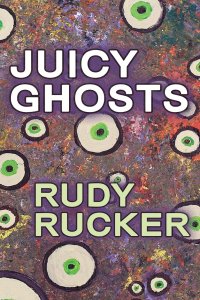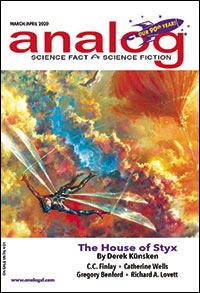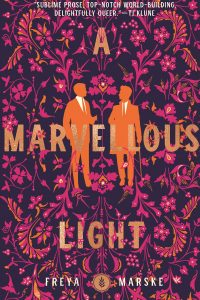Paul Di Filippo Reviews Juicy Ghosts by Rudy Rucker
 Juicy Ghosts, Rudy Rucker (Transreal Books 978-1940948485, 332pp, $24.95) September 2021.
Juicy Ghosts, Rudy Rucker (Transreal Books 978-1940948485, 332pp, $24.95) September 2021.
If any currently working SF author can be held up as an instance of the main thesis in that valuable but sadly underutilized volume by the Panshins—The World Beyond the Hill: Science Fiction and the Quest for Transcendence—then Rudy Rucker is that writer. All his work involves humanity’s desire to reach or at least to observe a higher plane of existence, to cut through and get beyond maya, the false front we superficially imagine to be reality. This choppy quote that I assembled from the Panshins’ study describes Rucker’s work to a tee. “[The] storytellers of SF, having come to recognize the limitations of a world built upon scientific materialism, altered their myth and laid down the basis for a new age of higher consciousness…. indications of transcendence: of unknown things, higher possibilities, and human becoming…the transcendence at the heart of science fiction…”
Reading any book from Rucker is always a fresh exercise in expanding one’s mind, heart and sense of cosmic potential, and his latest—crowdfunded into existence—is no exception.
I might mention at this juncture that although he seldom writes in a series, all his most recent books share many motifs and tropes, almost but not quite rendering them into a consensus future history. Biohacks, artificial telepathy, immortality via uploads (lifeboxes), wacky aliens, fated lovers—these constituents and more flesh out the Rucker pantheon.
Juicy Ghosts is unique in Rucker’s canon in that it presents a tainted timeline radically inconsistent with its predecessors—almost, you might say, like what we’ve been living through for several years. This engagé attitude and activist mode marks a real first for Rucker (without diminishing his other alluring traits), and brings out his natural alliance with folks like Philip K. Dick, Christopher Brown, and Paolo Bacigalupi.
Here, the USA has been dominated for eight years by the buffoonish, malicious, dangerous and dangerously incompetent President Ross Treadle, an analogue of one D****d T***p. Backing him are many others under the label of the Top Party and the Citadel Club. The man’s presence actually also spreads a literal disease. Luckily, we have, in Pynchonesque terms, “The Whole Sick Crew” of malcontents, rebellious geniuses, sexy ninjas and bold troublemakers to stand against him.
The first part of the book mainly revolves around Molly Santos and her quest to cure Treadle Disease. But while successful, she suffers a dramatic transmutation in the process, and will not return until book’s closure in a nicely resonant resurrection. Subsequent chapters take Treadle himself off the scene. But his henchmen remain, with plans for dominance of the major enterprise on the planet: “taking long-term control of the largest immortality-rental company in the world—with unfettered access to the tens of thousands of lifebox minds inside the Skyhive server. They’ll set those minds to screwing up [new President] Sudah Mareek’s peaceable kingdom. People will be begging for the grand old Top Party. They’ll roar back into power, and it’s morning in America.”
The main bulwark against these actions is classic good-natured, absent-minded mad scientist Gee Willikers and his talented reincarnated (with halo!) lover Mary, as well as host of biofabbed kritters and colorful human accomplices. Bad guys such as Carson Pflug also get narrative moments. Needless to say, in a welter of improvisations, eureka moments and frenzied scrambling, the Good Guys eventually triumph, liberating lifebox technology for all.
Rucker’s “spontaneous bop prosody” (Kerouac’s term) seduces the reader and serves as the rails for a rollercoaster ride up to the stratosphere and beyond. Here’s Molly upon her return.
I’m not the same now. I can renormalize the physical world. But before I get into all that, what was it like, that missing year and a half? How did it feel? Wak wak wak! I was a duck in an eggshell, pickled in brine, marbleized into a spacetime hypersphere, microtomed on the bias, and served as Hilbert space sushi. Wheenk wheenk wheenk! I was a mile-long sob-story on a roller towel, embossed in Braille by the trip-hammers of my eye beams, and deciphered by fingers on the roller’s ends. Yonk yonk yonk! I was Molly here, Molly there, yolly Molly everywhere. A background buzz in Metatron’s thoughts, a dream within the cosmic Dream, a shoe within a shoehorn, a yonk within a wheenk within a wak within a huh?
Rucker’s evocation of the physical world and a West Coast vibe are also excellent. Despite being a transplant to California (admittedly of long residence by now), Rucker has fully internalized the heady atmosphere of gnarly times amidst sun-blasted climes. Our very own SF Dude abides.
Finally, Rucker’s novums—psidots, teepspace, etc.—have been continuously refined from previous iterations to approach patentability. His future, bad politics and all, is inherently livable and tangible. You will enter willingly and exit with a wish you could stay.
One last heads-up. Also available to accompany this book is a companion volume, Notes for Juicy Ghosts, in which Rucker generously shares all the ideation, stress, exuberance, angst, fannish gossip, peer support and hopeful wandering-in-the-wilderness that attended the composition of the novel. It’s a feast for Rucker fans, and an enlightening guide for any writers looking to emulate his path or even for unaspiring readers keen to know how the sausage is made.
 While you are here, please take a moment to support Locus with a one-time or recurring donation. We rely on reader donations to keep the magazine and site going, and would like to keep the site paywall free, but WE NEED YOUR FINANCIAL SUPPORT to continue quality coverage of the science fiction and fantasy field.
While you are here, please take a moment to support Locus with a one-time or recurring donation. We rely on reader donations to keep the magazine and site going, and would like to keep the site paywall free, but WE NEED YOUR FINANCIAL SUPPORT to continue quality coverage of the science fiction and fantasy field.
©Locus Magazine. Copyrighted material may not be republished without permission of LSFF.






